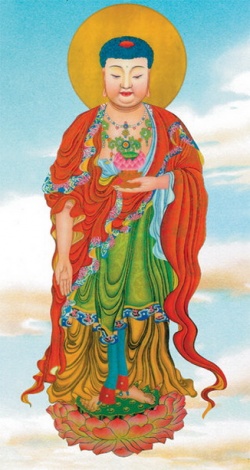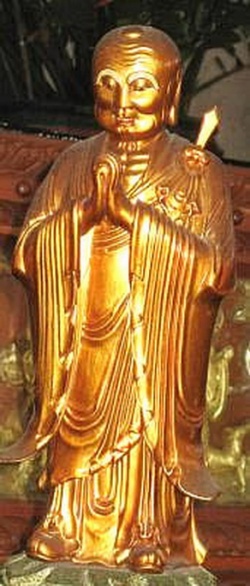Difference between revisions of "Jarā Sutta"
(Created page with "thumb|250px| <poem> Jarā Sutta.-Once,when the Buddha was on a visit to Sāketa,a rich {{Wiki|brahmin}} and his wife,seeing him,called h...") |
|||
| Line 1: | Line 1: | ||
[[File:Do1 400.jpg|thumb|250px|]] | [[File:Do1 400.jpg|thumb|250px|]] | ||
<poem> | <poem> | ||
| − | [[Jarā Sutta]].-Once,when the [[Buddha]] was on a visit to Sāketa,a rich {{Wiki|brahmin}} and his wife,seeing him,called him their son and ministered to him with great affection.It is said that for five hundred [[births]] they had been the parents of the [[Bodhisatta]].At the conclusion of a meal the [[Buddha]] preached to them and they became [[Sotāpannas]].After the [[Buddha]] left Sāketa they continued to lead pious lives and became [[arahants]] before [[death]].At their {{Wiki|funeral}} they were accorded all the honours due to [[arahants]],and at the conclusion of the ceremonies the [[Buddha]],who was present,preached this [[sutta]] to those assembled there (SNA.ii.531ff; DhA.iii.317ff; cp.- Sāketa | + | [[Jarā Sutta]].-Once,when the [[Buddha]] was on a visit to Sāketa,a rich {{Wiki|brahmin}} and his wife,seeing him,called him their son and ministered to him with great affection.It is said that for five hundred [[births]] they had been the [[parents]] of the [[Bodhisatta]].At the conclusion of a meal the [[Buddha]] [[preached]] to them and they became [[Sotāpannas]].After the [[Buddha]] left [[Sāketa]] they continued to lead pious [[lives]] and became [[arahants]] before [[death]].At their {{Wiki|funeral}} they were accorded all the honours due to [[arahants]],and at the conclusion of the {{Wiki|ceremonies}} the [[Buddha]],who was present,preached this [[sutta]] to those assembled there (SNA.ii.531ff; DhA.iii.317ff; cp.- [[Sāketa]] [[Jātaka]]) |
| Line 9: | Line 9: | ||
804 | 804 | ||
[[File:Dow-ol.jpg|thumb|250px|]] | [[File:Dow-ol.jpg|thumb|250px|]] | ||
| − | Short indeed is this life. | + | Short indeed is this [[life]]. |
| − | You die within a hundred years. | + | You [[die]] within a hundred years. |
Indeed, if you live beyond that | Indeed, if you live beyond that | ||
| − | You surely die of decrepitude. | + | You surely [[die]] of decrepitude. |
''Appaṃ vata jīvitaṃ idaṃ oraṃ vassasatāpi miyyati | ''Appaṃ vata jīvitaṃ idaṃ oraṃ vassasatāpi miyyati | ||
| Line 19: | Line 19: | ||
805 | 805 | ||
| − | People grieve for their beloved possessions; | + | [[People]] grieve for their beloved possessions; |
But nothing is possessed forever. | But nothing is possessed forever. | ||
Having seen that separation does indeed happen, | Having seen that separation does indeed happen, | ||
| − | One should not lead the household life. | + | One should not lead the [[household life]]. |
[[File:Mahakasyapa3.jpg|thumb|250px|]] | [[File:Mahakasyapa3.jpg|thumb|250px|]] | ||
| − | ''Socanti janā mamāyite na hi santi niccā pariggahā | + | ''Socanti janā mamāyite na hi [[santi]] niccā pariggahā |
Vinābhāvasantamevidaṃ iti disvā nāgāramāvase'' | Vinābhāvasantamevidaṃ iti disvā nāgāramāvase'' | ||
806 | 806 | ||
| − | At death, | + | At [[death]], |
| − | That which a person supposes to be 'mine' is abandoned. | + | That which a [[person]] supposes to be 'mine' is abandoned. |
| − | Realising this, my wise disciples should not be inclined to possessiveness. | + | Realising this, my [[wise]] [[disciples]] should not be inclined to possessiveness. |
''Maraṇenapi taṃ pahīyati yaṃ puriso mamidanti maññati | ''Maraṇenapi taṃ pahīyati yaṃ puriso mamidanti maññati | ||
| Line 38: | Line 38: | ||
807 | 807 | ||
| − | On awakening, | + | On [[awakening]], |
| − | A man does not see what he met in a dream. | + | A man does not see what he met in a [[dream]]. |
Likewise, one does not see loved ones who have passed away. | Likewise, one does not see loved ones who have passed away. | ||
[[File:Mahakasyapa4.jpg|thumb|250px|]] | [[File:Mahakasyapa4.jpg|thumb|250px|]] | ||
| Line 48: | Line 48: | ||
When they were alive, | When they were alive, | ||
| − | People called by this name or that were both seen and heard. | + | [[People]] called by this [[name]] or that were both seen and heard. |
| − | But when dead, only their names live on to be uttered. | + | But when [[dead]], only their names live on to be uttered. |
''Diṭṭhāpi sutāpi te janā yesaṃ nāmamidaṃ pavuccati | ''Diṭṭhāpi sutāpi te janā yesaṃ nāmamidaṃ pavuccati | ||
| Line 56: | Line 56: | ||
809 | 809 | ||
| − | Those greedy for beloved possessions do not detach | + | Those [[greedy]] for beloved possessions do not detach |
| − | From grief, lamentation | + | From [[grief]], [[lamentation]] |
| − | And selfishness. | + | And [[selfishness]]. |
[[File:Ddha 80.jpg|thumb|250px|]] | [[File:Ddha 80.jpg|thumb|250px|]] | ||
Looking for safety, | Looking for safety, | ||
| − | Sages abandon possessions and lead the homeless life. | + | [[Sages]] abandon possessions and lead the {{Wiki|homeless}} [[life]]. |
''Sokapparidevamaccharaṃ na jahanti giddhā mamāyite | ''Sokapparidevamaccharaṃ na jahanti giddhā mamāyite | ||
| Line 68: | Line 68: | ||
810 | 810 | ||
| − | For a monk living withdrawn, | + | For a [[monk]] living withdrawn, |
Resorting to a secluded dwelling, | Resorting to a secluded dwelling, | ||
They say that it is fitting | They say that it is fitting | ||
| − | For him to not exhibit himself in the world. | + | For him to not exhibit himself in the [[world]]. |
''Patilīnacarassa bhikkhuno bhajamānassa vivittamāsanaṃ | ''Patilīnacarassa bhikkhuno bhajamānassa vivittamāsanaṃ | ||
| Line 78: | Line 78: | ||
811 | 811 | ||
| − | The sage | + | The [[Wikipedia:Sage (sophos|sage]] |
Is not tethered in any way. | Is not tethered in any way. | ||
He does not regard anything as either loved or hated. | He does not regard anything as either loved or hated. | ||
| − | Lamentation and selfishness do not stain him, | + | [[Lamentation]] and [[selfishness]] do not stain him, |
| − | Just as water does not stain a lotus leaf. | + | Just as [[water]] does not stain a [[lotus]] leaf. |
''Sabbattha munī anissito na piyaṃ kubbati nopi appiyaṃ | ''Sabbattha munī anissito na piyaṃ kubbati nopi appiyaṃ | ||
| − | Tasmiṃ paridevamaccharaṃ paṇṇe vāri yathā na limpati'' | + | Tasmiṃ paridevamaccharaṃ paṇṇe vāri [[yathā]] na limpati'' |
812 | 812 | ||
| − | A lotus leaf or a red lily | + | A [[lotus]] leaf or a red lily |
Is not stained by a waterdrop. | Is not stained by a waterdrop. | ||
| − | The sage, likewise, is not stained | + | The [[Wikipedia:Sage (sophos|sage]], likewise, is not stained |
| − | By lamentation and greed for what is seen, heard or cognised. | + | By [[lamentation]] and [[greed]] for what is seen, heard or cognised. |
| − | ''Udabindu yathāpi pokkhare padume vāri yathā na limpati | + | ''Udabindu yathāpi pokkhare padume vāri [[yathā]] na limpati |
Evaṃ muni nopalimpati yadidaṃ diṭṭhasutaṃ mutesu vā'' | Evaṃ muni nopalimpati yadidaṃ diṭṭhasutaṃ mutesu vā'' | ||
| Line 100: | Line 100: | ||
He does not suppose | He does not suppose | ||
| − | That he is intrinsically purified by what is seen, heard or cognised. | + | That he is intrinsically [[purified]] by what is seen, heard or cognised. |
| − | Nor does he wish to be thus purified by some auxiliary basis of attachment | + | Nor does he wish to be thus [[purified]] by some auxiliary basis of [[attachment]] |
By nothing is he either attracted nor repelled. | By nothing is he either attracted nor repelled. | ||
| Line 109: | Line 109: | ||
Notes on Translation: | Notes on Translation: | ||
| − | Verse 810) fitting: Critical Pali Dictionary calls asāmaggiya ‘want of concord, disharmony’. Sāmaggiya would thus be ‘harmonious’ or ‘fitting’. Norman has ‘agreeable’. | + | Verse 810) fitting: Critical [[Pali]] {{Wiki|Dictionary}} calls asāmaggiya ‘want of [[concord]], disharmony’. Sāmaggiya would thus be ‘harmonious’ or ‘fitting’. Norman has ‘agreeable’. |
| − | Verse 812) nopalimpati: from the reference in the previous verse, I have taken as “stained by lamentation and | + | Verse 812) nopalimpati: from the reference in the previous verse, I have taken as “stained by [[lamentation]] and [[greed]]”. |
| − | Verse 813) āññena: auxiliary basis of attachment. Translation discussed in Appendix 7. | + | Verse 813) āññena: auxiliary basis of [[attachment]]. Translation discussed in Appendix 7. |
Verse 813) neither attracted nor repelled: this continues a theme of v.811: “He does not regard anything as either loved or hated.”. For virajjati, Norman has ‘dispassioned’. But in the context of 811 it would mean ‘repelled’. | Verse 813) neither attracted nor repelled: this continues a theme of v.811: “He does not regard anything as either loved or hated.”. For virajjati, Norman has ‘dispassioned’. But in the context of 811 it would mean ‘repelled’. | ||
</poem> | </poem> | ||
Revision as of 10:12, 8 May 2014
Jarā Sutta.-Once,when the Buddha was on a visit to Sāketa,a rich brahmin and his wife,seeing him,called him their son and ministered to him with great affection.It is said that for five hundred births they had been the parents of the Bodhisatta.At the conclusion of a meal the Buddha preached to them and they became Sotāpannas.After the Buddha left Sāketa they continued to lead pious lives and became arahants before death.At their funeral they were accorded all the honours due to arahants,and at the conclusion of the ceremonies the Buddha,who was present,preached this sutta to those assembled there (SNA.ii.531ff; DhA.iii.317ff; cp.- Sāketa Jātaka)
On Decrepitude
Jarā Sutta
804
Short indeed is this life.
You die within a hundred years.
Indeed, if you live beyond that
You surely die of decrepitude.
Appaṃ vata jīvitaṃ idaṃ oraṃ vassasatāpi miyyati
Yo cepi aticca jīvati atha kho so jarasāpi miyyati
805
People grieve for their beloved possessions;
But nothing is possessed forever.
Having seen that separation does indeed happen,
One should not lead the household life.
Socanti janā mamāyite na hi santi niccā pariggahā
Vinābhāvasantamevidaṃ iti disvā nāgāramāvase
806
At death,
That which a person supposes to be 'mine' is abandoned.
Realising this, my wise disciples should not be inclined to possessiveness.
Maraṇenapi taṃ pahīyati yaṃ puriso mamidanti maññati
Etampi viditvā paṇḍito na mamattāya nametha māmako
807
On awakening,
A man does not see what he met in a dream.
Likewise, one does not see loved ones who have passed away.
Supinena yathāpi saṅgataṃ paṭibuddho puriso na passati
Evampi piyāyitaṃ janaṃ petaṃ kālakataṃ na passati
808
When they were alive,
People called by this name or that were both seen and heard.
But when dead, only their names live on to be uttered.
Diṭṭhāpi sutāpi te janā yesaṃ nāmamidaṃ pavuccati
Nāmaṃyevāvasissati akkheyyaṃ petassa jantuno
809
Those greedy for beloved possessions do not detach
From grief, lamentation
And selfishness.
Looking for safety,
Sages abandon possessions and lead the homeless life.
Sokapparidevamaccharaṃ na jahanti giddhā mamāyite
Tasmā munayo pariggahaṃ hitvā acariṃsu khemadassino
810
For a monk living withdrawn,
Resorting to a secluded dwelling,
They say that it is fitting
For him to not exhibit himself in the world.
Patilīnacarassa bhikkhuno bhajamānassa vivittamāsanaṃ
Sāmaggiyamāhu tassa taṃ yo attānaṃ bhavane na dassaye
811
The sage
Is not tethered in any way.
He does not regard anything as either loved or hated.
Lamentation and selfishness do not stain him,
Just as water does not stain a lotus leaf.
Sabbattha munī anissito na piyaṃ kubbati nopi appiyaṃ
Tasmiṃ paridevamaccharaṃ paṇṇe vāri yathā na limpati
812
A lotus leaf or a red lily
Is not stained by a waterdrop.
The sage, likewise, is not stained
By lamentation and greed for what is seen, heard or cognised.
Udabindu yathāpi pokkhare padume vāri yathā na limpati
Evaṃ muni nopalimpati yadidaṃ diṭṭhasutaṃ mutesu vā
813
He does not suppose
That he is intrinsically purified by what is seen, heard or cognised.
Nor does he wish to be thus purified by some auxiliary basis of attachment
By nothing is he either attracted nor repelled.
Dhono na hi tena maññati yadidaṃ diṭṭhasutaṃ mutesu vā
Nāññena visuddhimicchati na hi so rajjati no virajjatīti
Notes on Translation:
Verse 810) fitting: Critical Pali Dictionary calls asāmaggiya ‘want of concord, disharmony’. Sāmaggiya would thus be ‘harmonious’ or ‘fitting’. Norman has ‘agreeable’.
Verse 812) nopalimpati: from the reference in the previous verse, I have taken as “stained by lamentation and greed”.
Verse 813) āññena: auxiliary basis of attachment. Translation discussed in Appendix 7.
Verse 813) neither attracted nor repelled: this continues a theme of v.811: “He does not regard anything as either loved or hated.”. For virajjati, Norman has ‘dispassioned’. But in the context of 811 it would mean ‘repelled’.




